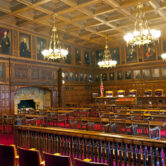SAN FRANCISCO (CN) — A private corporation can be held legally responsible for the cost of suppressing and investigating wildfires negligently started by their employees, the California Supreme Court ruled Monday.
The ruling found California's Health and Safety Code imposes corporate liability for the wrongdoing of an employee when they act within the scope of their employment under the longstanding principle of respondeat superior.
It also allows the California Department of Forestry and Fire Protection to pursue a legal action against Presbyterian Camp and Conference Centers to recover the $12 million it spent fighting the Sherpa Fire in 2016. The blaze consumed roughly 7,500 acres in rural Santa Barbara county.
The fire was started by Charles Cook, an employee responsible for maintaining a small camp and conference center in Rancho La Sherpa owned and operated by PCCC.
On June 15, 2016, a malfunctioning chimney in one of the cabins caused it to fill with smoke. Cook, who lived on the premises, grabbed a smoldering log from the fireplace and transported it to an outdoor fire pit. Sparks from the log ignited the dry vegetation surrounding the cabin and ignited what became known as the Sherpa Fire.
A subsequent probe by Cal Fire uncovered numerous misdemeanor fire safety violations on the property, including kindling a fire in a malfunctioning fireplace, lack of fire extinguishers or water source, and failure to clear dry vegetation. It sought to recover the cost of suppressing and investigating the source of the fire from both Cook and his employer.
In arguing against liability for Cook’s actions, Presbyterian zeroed in on Health and Safety Code Section 13009, which it believes the Legislature amended in 1971 to do away with respondeat superior by deleting a cross-reference to section 13007, which refers to conduct by “[a]ny person. . . personally or through another.”
It claimed this minor change in language means a corporation can only be held directly liable by its own failure to act, or when it authorizes its employees or agents to act a certain way.
Writing for an unanimous Supreme Court, Justice Joshua Groban said the Legislature never intended to abolish respondeat superior, which “has long been a bedrock doctrine of the common law” and that it would be inappropriate for the court to determine otherwise.
“California’s Health and Safety Code sections 13009 and 13009.1 allows Cal Fire to recover the taxpayer dollars it spends on fighting and investigating wildfires that were caused by human negligence," Groban added. "To decide otherwise would misread the plain language of the statutes enacted by the Legislature, undermine the legislative history, and cast aside the goals and purposes that underpin the statutes at issue.”
Groban noted Presbyterian also advanced a legal fiction that corporations are people capable of acting on their own, though they can really only act through their employees or agents.
"While Presbyterian’s proposed interpretation of section 13009 contemplates the imposition of at least some forms of direct corporate liability, it ignores the fact that it can be difficult to prove that a corporation is directly liable for the actions of its employees or agents," Groban wrote.
Cal Fire spokesperson Jon Heggie said in an email that the agency was pleased by the court's opinion.
"Cal Fire is pleased, on behalf of the people of the state of California, that the California Supreme Court unanimously held that Health and Safety Code sections 13009 and 13009.1 incorporate the common law theory of respondeat superior," Heggie wrote. "As the court stated, to decide otherwise would misread the plain language of the statutes enacted by the Legislature, undermine the legislative history, and cast aside the goals and purposes that underpin the statutes at issue."
Subscribe to Closing Arguments
Sign up for new weekly newsletter Closing Arguments to get the latest about ongoing trials, major litigation and hot cases and rulings in courthouses around the U.S. and the world.







